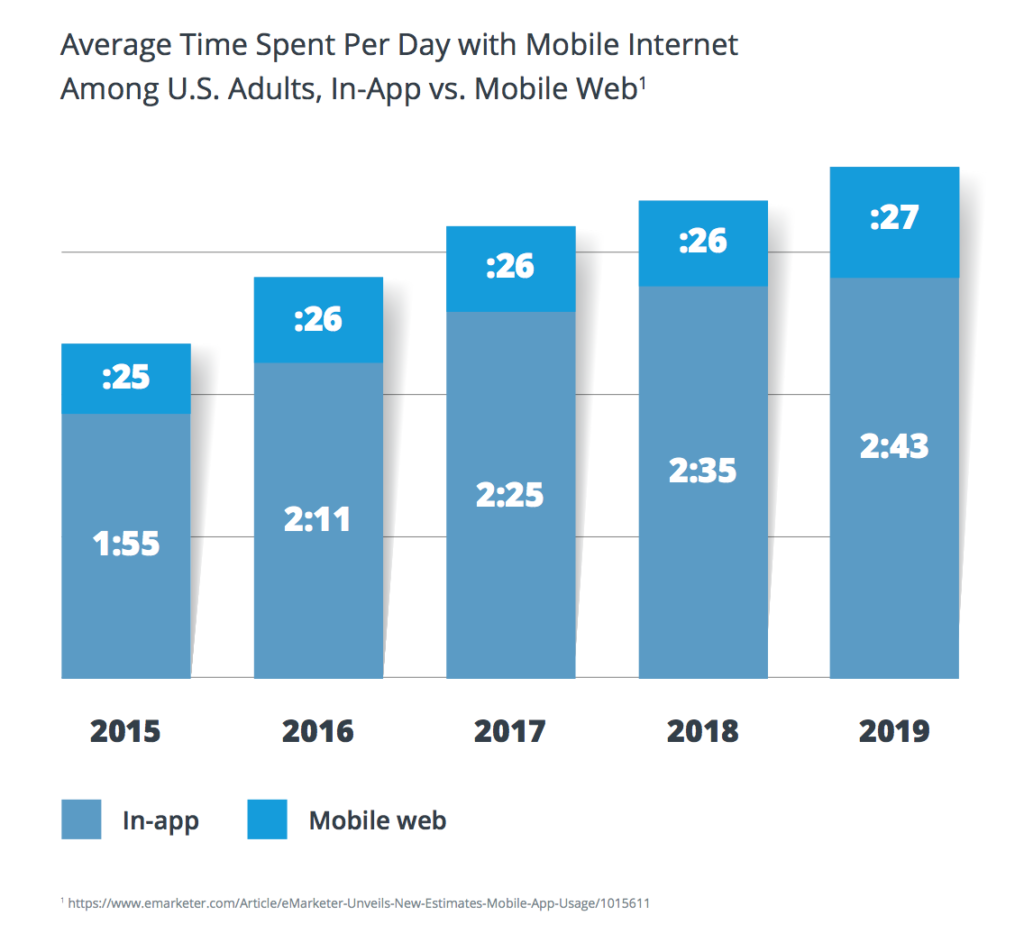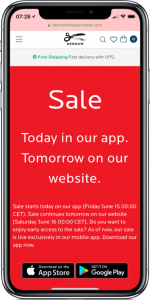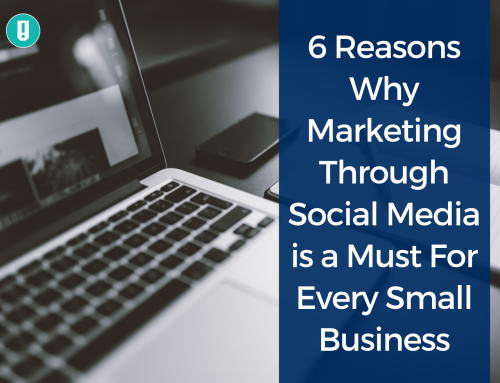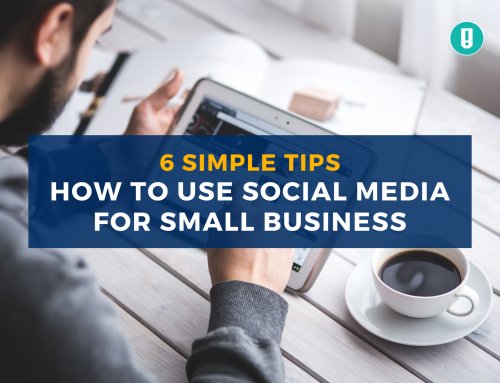We’re at a point where nearly 6 in 10 website visits are from mobile. This makes sense; people have their phones on them all the time and are often browsing the web at work, college, or when out and about. Phones are basically computers in our pockets and are super convenient…
The stats speak for themselves:
- 40% of ecommerce sales happen on mobile
- 79% of smartphone users have bought products online in the last six months
- Mobile purchases amount to over $600 billion worldwide and are growing rapidly
So if we’re looking at a majority of web searches happening by mobile, it’s time to consider our options.
Exactly which is better, websites or apps?
Mobile selling on websites
The selling potential of websites is very real. They’ve been around since the dawn of the web and marketers have honed their functionality over the decades.
Here are some of the ways websites are amazing for selling on mobile…
Websites don’t need to be downloaded by users before they can access them. This makes them super convenient and hassle free.
Websites can be easily accessed via a URL and easily discovered by search.
Lots of mobile users visit websites after discovering links on social media (which is very mobile dominated). This means lots of people come across your site’s content via mobile apps like Twitter, Facebook and Instagram.
Websites can be made mobile friendly and can adapt to different types of devices. This is super important because a poor mobile user experience (UX) will drive mobile users away and harm your business.
If you’re not sure if your site is mobile friendly you can easily perform Google’s free mobile friendliness test.
A well designed website is structured so that all the different pages flow together so you can direct users around your site based on their preferences and browsing choices.
For example, landing pages (which are often users’ first experience of your website) are a fantastic way to convert leads.
Average landing page conversions rates are 2.35%, with the top 25% landing pages converting at upwards of 5%. The top 10% of landing pages enjoy conversion rates of 11% or higher.
Websites give users an all-round view of your brand. They offer you multiple ways to sell on mobile. Perhaps a user follows a social media link to your blog… they are impressed by your mastery of your niche and click onto your About page. This then takes them to your site’s online store where they find you have just the product they are looking for… and what’s more you also have a first time discount voucher they can use.
It should be clear from this hypothetical example that there a myriad ways your audience could come to your website on mobile and then by guided through your sales funnel in a very structured and high-converting way.
The advantages of selling your products via mobile apps
Having a mobile friendly website is a very important part of your sales arsenal.
But given that apps are actually designed to fully take advantage of mobile functionality, surely it’s a no-brainer to turn to apps as the best way to sell on mobile?
A lot of stats seem to back this up.
Users spend far more time browsing the mobile internet in apps than via mobile websites.

This makes sense because mobile apps are typically 150% faster than websites. This is because they store data locally whereas websites have to retrieve information from the web which can slow things down. They’re also designed to be used offline as well as online, unlike many websites.
Mobile apps provide an excellent user experience because they can be easily customised by users to suit their purposes, rather than websites which tend to be one-size fits all.
The global app industry was worth $88 billion in 2016 and continues to grow. In 2017 in-app purchases rose by 35% to reach $60 billion.
Amongst the top ten most popular apps are ecommerce apps like Amazon, Groupon and Seamless (the most popular food ordering app).
Apps don’t just drive sales for big businesses like Amazon and Uber. Mobile apps also work wonders for boosting small business sales.
A big reason small businesses build mobile apps is to improve customer service (36%) help increase sales (34%), according to a retail survey.
 When jean retailer DENHAM launched a sale on their app one day before it went live on their website they tripled their revenue and saw conversion rates increase by 600%.
When jean retailer DENHAM launched a sale on their app one day before it went live on their website they tripled their revenue and saw conversion rates increase by 600%.
Mobile apps also help improve customer loyalty which has a big impact on long term sales. Online shoppers are highly motivated by discounts and sales coupons. In fact, small business have claimed nearly 20% of total business comes from promotions aimed at attracting new customers.
Apps also let you use push notifications to boost engagement with users and make sure your messages get to them. Amazingly, push notifications have a higher open rate than even the mighty email! They make sure you reach audiences at specific times and can even be triggered by location using geofencing.
So which is better for mobile selling… websites or apps?
As much as we hate to sit on the fence, the reality is that neither websites or apps are better than each other at generating mobile sales for your company.
Apps tend to be used by your most active and frequent customers, whereas websites see far more general use.
If you just relied on an app to sell your products you would be missing out on potential leads, brand building opportunities, and nurturing new customers.
On the other hand if you just relied on websites you wouldn’t be able to foster customer loyalty in that way that mobile apps are uniquely placed to do. So in conclusion, you do need to build a mobile app if you are to optimize your mobile selling strategy.
But, when it comes down to it, we live in a world where brands need to grasp the concept of mobile marketing, which is all about using a variety of different marketing tools and techniques to reach out to your audience. It’s the future, and it’s here to stay.








Leave A Comment